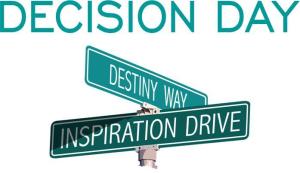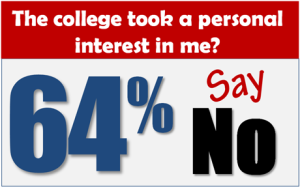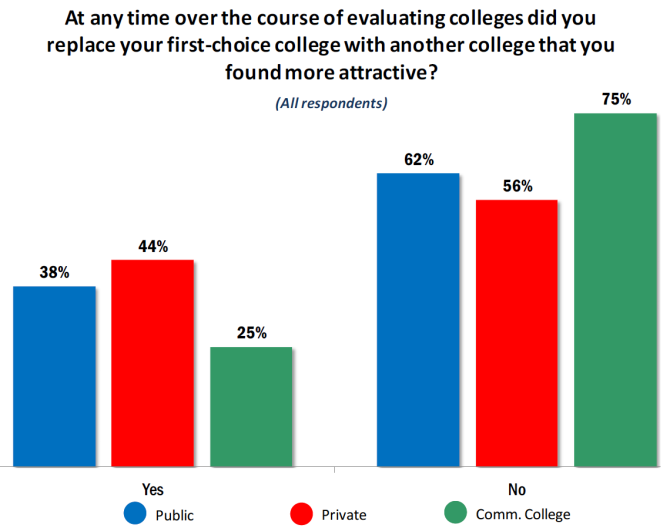A recent story by Beckie Supiano in The Chronicle for Higher Education, “Students’ College Choices Aren’t Totally Rational (and That’s OK),” included insights from our most recent nationally co-sponsored study, The Excitement Factor!. Supiano writes, “For many students, choosing where to go to college is, at least in part, an emotional decision. That’s not one more higher-education problem to be solved. It might even be a good thing.” In interviews with industry professionals including college and high school counselors, Supiano reports on the influence of the emotional connection, often referred to as the “AHA!” moment, for a student making his or her college choice.
The most successful college enrollment teams recognize the value of creating an environment that will foster excitement about attending their college. Even so, it can be a challenge in today’s competitive higher-ed marketplace. One of the questions we get asked most often is this: “What is the one thing we can do to differentiate our college?”
 The answer is: Take a personal interest in the prospective student.
The answer is: Take a personal interest in the prospective student.
If you are thinking that is too simple, or that most colleges do this already, two-thirds of prospective students will disagree with you. In truth, most college-bound students say that the colleges they most seriously considered never took a personal interest in them at any point in the recruiting process.
Student excitement about a college is enhanced when they perceive that the college has taken a sincere personal interest in them. And, as a practical matter, the more personal interest you take in a student the more you will find out about his or her unique combination of interests, preferences, desires, anxieties, and aspirations. With that greater understanding you will naturally communicate a unique value proposition. The student will perceive you as unique among their available choices. You will have reached the coveted state of differentiation.
For a significant percentage of students who reached the application or admit stages of the funnel, the college’s personal interest in them, or lack of it, was influential in their college selection decision.
With 36% to 42% of students in the public and private pools, respectively, saying that this was influential in their college selection, it underscores the opportunity for colleges to impact enrollment by demonstrating a personal interest in students across every brand touch point of the institution.
Best Practices: How personal interest is exhibited by the college.
Students respond very favorably to highly personalized, well-crafted emails that address their individual interests. Any type of communication that appears to be genuinely targeted to the individual student is likely to be well received, interpreted as personal and stands out from other colleges.
One student, referring to her multiple interactions with a large public university, said, “From the beginning, the communication felt very personal and made me feel wanted.”
Many students relayed stories of colleges building relationships with them in their sophomore and junior years of high school. They said that personalized individual attention exhibited by the college makes them feel more confident, more important, more wanted, more recognized, and more excited about attending.
There are communication techniques your staff can learn that will help them feel confident about reaching out to their prospective students to ask the right questions. This is one of the core techniques we teach in the Interactive Counselor Training Workshops we hold on college campuses throughout the country. It is also a key component of YES, our Yield Enhancement Tool.
Relationship building isn’t the role of the admissions office alone. Students told us that they responded to personal attention exhibited across all brand touch points on campus; from admissions, to faculty, to financial aid, to anyone who comes into contact with a prospective student, even the landscaper who is helpful in providing directions to a student visiting campus for the first time.
The release of The Excitement Factor! is creating a great deal of thought-provoking discussion among enrollment managers and higher education marketing professionals. The project uncovered a wealth of highly valuable information on how your ability to create student excitement about your college can drive your enrollment. You can DOWNLOAD the report now.
Continue the conversation on Twitter @LongmireCo. Be sure to Subscribe to Versions of Conversion today so you don’t miss any of this highly-valuable information.
 Rick Montgomery is as an Enrollment Strategist at Longmire and Company. With over 20 years in higher education marketing, he brings an innovative approach to helping colleges and universities meet their enrollment goals. Rick can be reached at 913/492.1265 x.708 or via email at rmontgomery@longmire-co.com.
Rick Montgomery is as an Enrollment Strategist at Longmire and Company. With over 20 years in higher education marketing, he brings an innovative approach to helping colleges and universities meet their enrollment goals. Rick can be reached at 913/492.1265 x.708 or via email at rmontgomery@longmire-co.com.
 For college admissions counselors and enrollment managers facing this challenge, we have some good news and important insights gleaned from our latest co-sponsored study, The Excitement Factor! Of the 12,000 students participating in the study, 20% committed to the college of their choice after the first of May.
For college admissions counselors and enrollment managers facing this challenge, we have some good news and important insights gleaned from our latest co-sponsored study, The Excitement Factor! Of the 12,000 students participating in the study, 20% committed to the college of their choice after the first of May.





